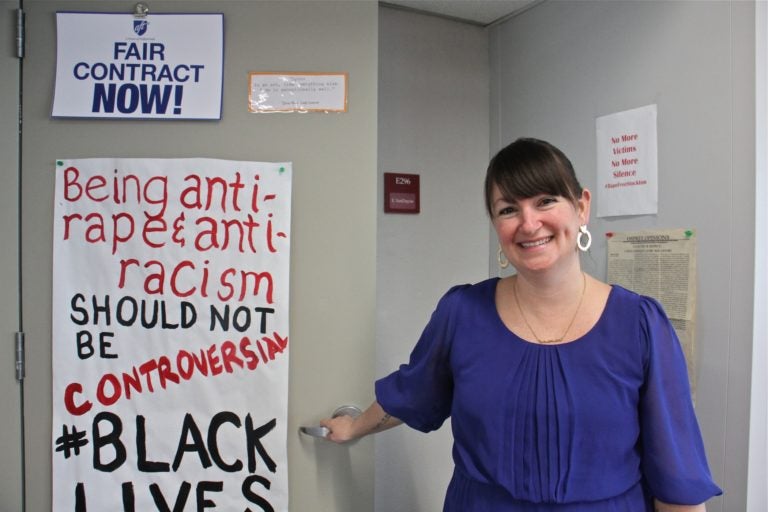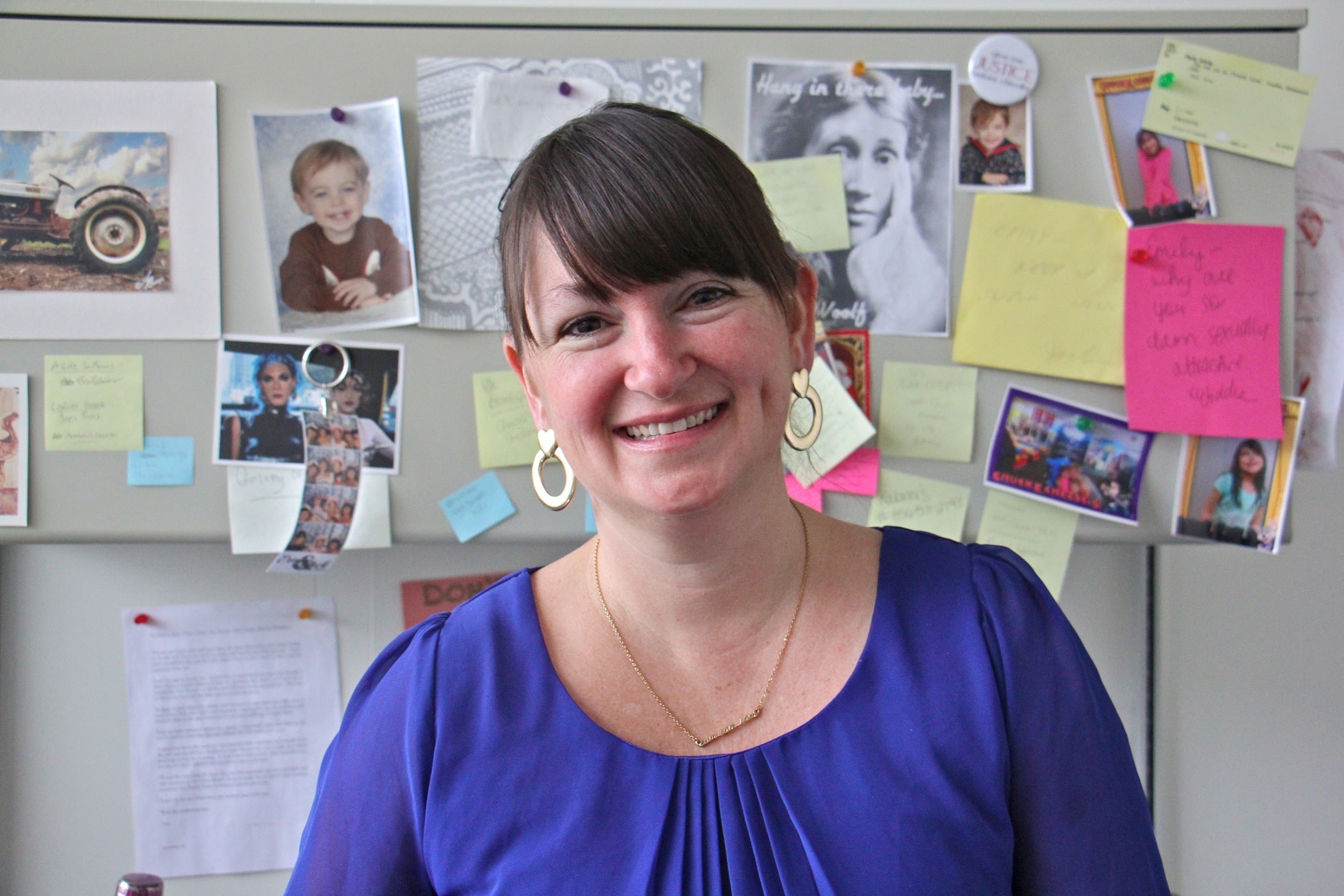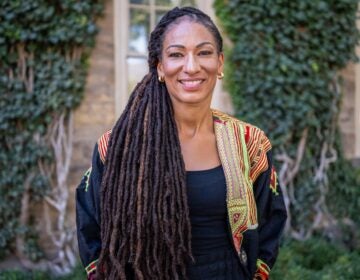From ‘broke single mom’ to Fulbright: An N.J. woman’s inspiring turnaround
‘Your life has worth. Go after the things you want,’ Stockton University Prof. Emily Van Duyne tweeted on learning she’d won the prestigious fellowship.
Listen 2:22
Emily Van Duyne is an assistant professor of writing and first year studies at Stockton University. She was recently awarded a Fulbright scholarship. (Emma Lee/WHYY)
Emily Van Duyne screamed — then hyperventilated — when she opened the email last week awarding her a Fulbright fellowship.
That’s new, she thought playfully, as the joy of the moment washed over her. Hyperventilation.
“I’ve never responded that way, I don’t think, to any good news before,” she said and laughed.
Yes, she would get to take her family to Greece. And yes, Van Duyne, a Stockton University professor and scholar on the American poet Sylvia Plath, would get to follow in the steps of a personal idol.
“Sylvia Plath was a Fulbright Scholar, so it’s very special to me to be able to do something that she did,” she said as tears welled in her eyes.
But the loss of breath was born of something else — something, she wrote on Twitter later that day, that had been a decade in the making.
“10 years ago, I thought my life was over. I was a broke single mom, recovering from an abusive relationship. I thought I had nothing,” she said.
“Today, I found out I won a Fulbright fellowship. Remember: it can get better. Your life has worth. Go after the things you want.”
10 years ago, I thought my life was over. I was a broke single mom, recovering from an abusive relationship. I thought I had nothing.
Today, I found out I won a Fulbright fellowship. Remember: it can get better. Your life has worth. Go after the things you want.
— Emily Van Duyne (@EmilyVanDuyne) February 21, 2020
Finding her muse
Van Duyne, now 40, was a teenager growing up in Ventnor, near Atlantic City, when she first encountered the work of Sylvia Plath. She was mesmerized.
“When you’re 16 and this woman is writing things like, “Daddy, daddy, you bastard, I’m through,’ you’re just like, ‘Oh, the audacity of it!’” she said. “The voice is unlike anything I’ve ever heard. You do get this sense when you’re reading her poetry that there is just this unshakable, inimitable force behind the words.”
Van Duyne went on to earn her master’s degree and then started a career in academia like many people do: as an adjunct professor teaching at multiple colleges for little more than minimum wage.
“I was what we call a freeway flyer,” she said. “I was the master of South Jersey backroads.”
It was around this time she met and fell in love with a fellow writer. He boasted degrees from reputable institutions and came from a supportive middle-class family. Those trappings helped mask deeply problematic behavior.
It was only once Van Duyne was pregnant in 2010, she said, that she learned her partner was addicted to opioids and sleeping with underage girls.
The couple moved to his hometown in Texas to try to get him help. But before long, a cycle of physical and emotional abuse made the situation untenable for Van Duyne and her infant son.
“He’s going to kill me,” she remembers thinking.
Working her way back
Van Duyne said that in her early 20s, she thought she was Sylvia Plath reincarnated.
That, it turns out, is common with Plath fans. Van Duyne said when she mentioned the belief to a fellow Plath scholar some years later, that woman responded, “Oh, I’ve got a whole chapter in my book about people that do that, you know. There’s a ton of them.”
Commonality aside, it’s a troubling comparison. Plath was deeply depressed most of her adult life. Her marriage to Ted Hughes, a British poet she met while on a Fulbright in England, was likely abusive. In 1963, a few months after Plath learned Hughes was having an affair, a period of stunning creative output was cut short when she stuck her head in an oven and gassed herself.
Fortunately, the similarities between Plath and Van Duyne do not run that far.
In late 2011, Van Duyne fled Texas with her son Hank and returned to New Jersey.
“I don’t know how I’ll survive this,” she thought at the time. “My heart was broken. When you are in an abusive relationship, the way that psychology works is to totally strip you of your agency and identity.”
But she went back to work as a freeway flyer, slowly rebuilding the trust that had been broken with her family and her employers.
In 2014, a full-time position opened up at Stockton. She got it. The same year, she started dating a single father who had moved in next door to her parents.
She earned tenure last year and plans to marry Vincent DiGiacinto, her “sweetheart,” during a ceremony at a backyard barbeque in the summer.
“Vincent said, ‘I’ll only do it’ — as in I’ll only have a big wedding, because we were just going to go to the courthouse — ‘if we can have hot dogs,’” she said. “I was like, ‘Absolutely. Done.’ So that’s the plan.”
The Fulbright email capped the turnaround. She will spend the spring 2021 semester teaching a course on Plath at Aristotle University while resuming her graduate-school research on the links between the poet and Plato. Hank, now 9, and DiGiacinto’s daughter Stella, 11, will join.
Van Duyne tried to put it in perspective.
“I grew up as this kind of accelerated, precocious kid, and everyone always said, ‘Oh, you’re going to do these great things,’” she said. “And then there was this really, really hard dark period of my life where I thought that all those things had disappeared from my grasp, that there was no way that I would ever do them.
“So it’s nice to do them,” she said. “It feels good.”

Seizing her moment to speak out
In her time at Stockton, Van Duyne has become an outspoken critic of the administration’s approach to preventing and responding to campus sexual assault, prompting a series of mutual recriminations that has devolved into litigation.
Her activism has coincided with a critical time for the university — since 2018, nine women have filed federal lawsuits accusing Stockton of failing to create a safe learning environment for female students — as well as for herself. She stuck her neck out at the same time she was up for tenure last year.
It so happens Van Duyne is also in the process of writing a book called “Loving Sylvia Plath.” In it, she seeks to explain how, after Plath’s death, Hughes and other men used their control over her unpublished writing to shape her biography in self-serving ways.
Van Duyne wrote on the website Literary Hub this week that her goal is to do for Plath what so many survivors of sexual assault and domestic violence never get the chance to do: rewrite the stories of their lives.
Van Duyne was able to do that for herself. As for Plath, she said: “She deserves it. We all do.”
WHYY is your source for fact-based, in-depth journalism and information. As a nonprofit organization, we rely on financial support from readers like you. Please give today.





